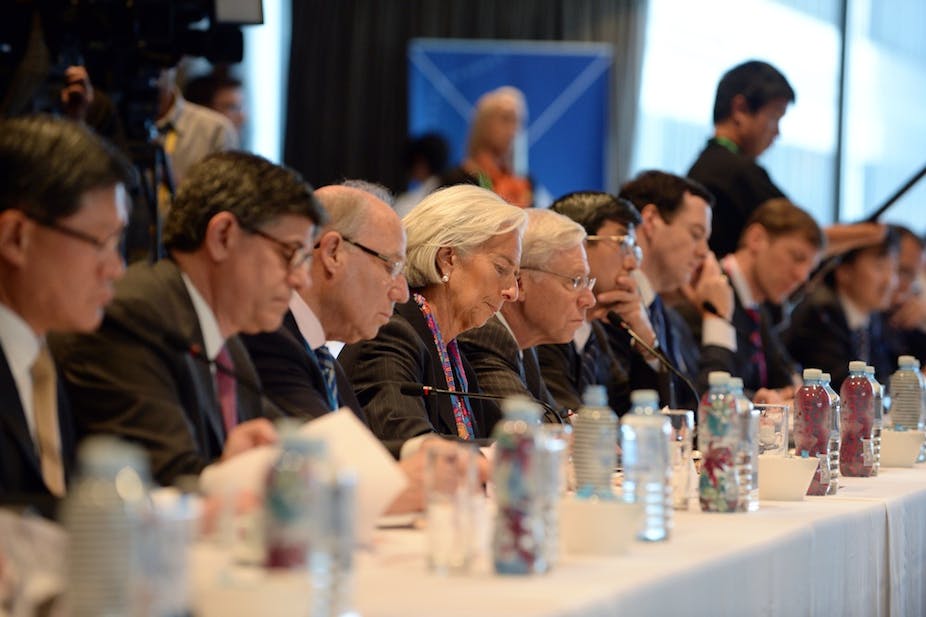Australia should cut company taxes and increase innovation to avoid falling behind in the productivity race, according to a new report from the Organisation for Economic Co-operation and Development.
The report says structural deficiencies in policy settings are slowing the pace of the global economic recovery.
It urges Australia to cut company tax and replace the lost revenue with an increase in the GST. And it says new measures are needed to boost business-research collaboration.
Countries risk “falling into low growth traps for the medium and long term” as a result of low productivity, according to OECD Secretary-General Angel Gurría.
“Key drivers of growth today – credit, investment and international trade – have been very, very sluggish, in some cases unusually weak,” Gurría warned as he launched the Going for Growth report with Treasurer Joe Hockey in Sydney, on the eve of the G20 Finance Ministers meeting.
Gurría said monetary policy options had been used up after the global financial crisis and said it was time to consider structural measures to revive productivity and other growth bottlenecks.
“The message is unambiguous, go structural,” he said. “We need to design and implement better structural policies.”
John Wanna, a public administration academic at ANU, says Australia is likely to reduce corporate tax rates, but only when the government can afford to do so.
But he said he understood that a broadening of the GST would not be recommended by the Commission of Audit underway now.
“A brave government could extend the 10% to basic foods, I think it would be broadly acceptable to voters, but we will get ourselves hopelessly tied up in debates over compensation for lower incomes and pensioners.”
Professor Wanna said the May budget was Abbott’s “one big chance to get some serious structural adjustment”. His next opportunity would be after the 2016 election, if the Coalition retained power.
Gurría also praised labour market reforms worldwide, particularly in weak European economies, but said other measures had not kept up.
He said Australia had done “better than most, but had its own problems with productivity”.
Treasurer Hockey told those gathered for the G20 that the last government had undone good work on labour market reform and said the government would take the recommendations of an awards modernisation review to the next election.
But Roy Green, Dean of the UTS Business School, said Australia’s labour costs were “well under control”.
“Most data shows we are in the range of most other countries and it sidesteps the question of what will give us competitive advantage,” he said.
“There will always be countries that can outmanoeuvre us on labour cost. We need to move up the chain and value add.”
Professor Green said OECD data consistently showed Australia had one of the lowest levels of collaboration between academia and business. He said past government programs had done little to change this.
Professor Green said the gains made in the commodity boom were responsible for a lull in productivity-increasing reforms. He said measures of multi-factor productivity had actually gone backward in the early 2000s.
But he blamed high investment with little output in the mining sector, a long-running drought and the gold plating of electricity assets for some of this fall.
“Stringent” investment screening
The report said that while reforms had moved at a faster than normal pace following the global financial crisis, there was still further work to be done to reduce barriers to competition.
While many barriers to trade and investment had been lowered over the decade from 2003, barriers to foreign direct investment saw an increase.
The OECD had previously recommended Australia ease the stringency of foreign direct investment screening procedures.
But Jeffrey Wilson, a fellow of the Asia Research Centre, said Australia “maintained one of the most open FDI regimes in the world”. He said current policies presumed in favour of investment and only put limits on a small number of sensitive sectors.
The overwhelming bulk of screened applications have been approved, he said. “In sensitive sectors where special restrictions apply, investment screening does reduce Australia’s investment attractiveness.”
“Outside the limited number of sensitive sectors, these restrictions are light and do little to temper interest in Australia.”
“Chinese investment in the mining industry provides a case in point.”
“Despite extremely high levels of political controversy over the impact of Chinese state-owned enterprises in the iron ore and coal sector, no Chinese investment in an Australian mining business has ever been rejected by the federal government,” Dr Wilson said.

